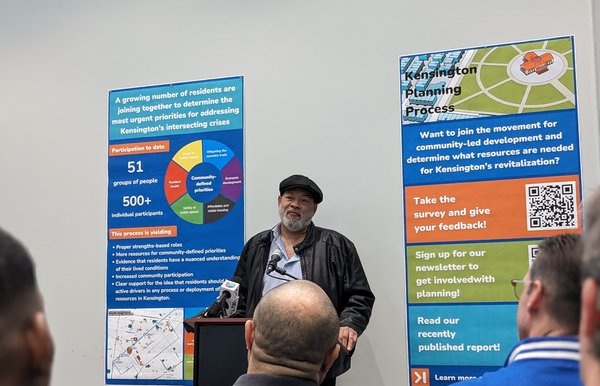Kensington neighborhood advocates are using opioid settlement funds that Philadelphia was awarded last year to launch a program to help homeowners and renters.
The Kensington Planning Process (KPP), a collaborative effort from community development groups Impact Services Corp. and New Kensington Community Development Corp. (NKCDC), will open a new grant program for Kensington renters and homeowners. Using the city's $200 million opioid settlement funds, $2 million will go toward repairing 400 homes in the neighborhood and another $1.5 million is set aside for eviction and foreclosure protections.
- MORE NEWS
- Seal pup found in Ocean City dies less than two weeks after rescue
- Shooting near Muhlenberg College in Allentown injures 4 people
- Casino-like 'skill games' targeted in controversial City Council legislation
A recent report from KPP found that Kensington residents have a median household income of $29,000, more than $20,000 less than the city's average. At the same time, Bill McKinney, executive director of NKCDC, said many Kensington residents are at risk of being displaced by both the opioid epidemic and impending gentrification.
"Kensington faces some of the most complex, intersecting crises in the nation," McKinney said. "What we also understand is the only way to address these is through truly collaborative, community-driven, comprehensive and trauma-informed approaches."
Addressing housing instability is more commonly becoming viewed as important for preventing opioid overdoses. One preliminary study published in June connects the risk of a person becoming homeless to the risk of that person overdosing on drugs. And another study from 2022 cited Philadelphia, noting that drug overdoses have been the leading cause of death among the city's homeless population since 2011.
The funding for the program is part of the $200 million the city will receive over 18 years from the federal government's opioid settlements. In 2023, Philadelphia received an initial $20 million, which included $7.5 million to be invested into Kensington.
That $7.5 million has been allocated to schools, parks and direct resident support, which includes eviction prevention and home repairs, according to Noelle Foizen, the city's overdose response unit director. The funding will go toward cleaning up parks, expanding programming at recreation centers, improving school safety and upgrading buildings.
"The Parker administration is committed to this community both now and in the future," Foizen said. "We are so proud to play a small role in the development of the Kensington Planning Process and look forward to continuing community-led collaborations."
Guillermo Garcia, a Kensington resident, helped locate neighborhood residents who were the first participants in the program. He said he found 17 residents with homes where "you walk in the door and you would look to the floor and see the basement." Repairs were completed on those homes as a test for the larger program.
"It was a great outcome, people were so happy, their gratitude was overwhelming," Garcia said. "I walk down the street now and I feel like the mayor because everybody knows me. It's a good feeling to help these people out, and there's still people that need help out there."
Residents who are 60 days late on their mortgages or rent can qualify for the program if they demonstrate financial hardship, officials said.
Up to $5,000 is available for repairs on each of the 400 homes selected for the program and the work will be completed by local contractors. Community development groups also plan to continue raising money to expand the program and remove barriers by offering paper and phone application options and working around homeowners insurance requirements.

